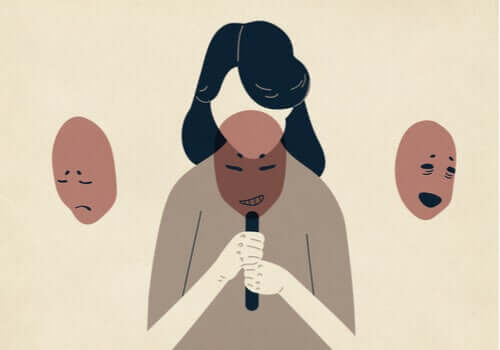It was the psychologist Stephen Karpman who proposed the idea that, in human relations that are not very true, manipulation mechanisms arise that he calls “control games”. In such “games”, the people involved end up basically adopting three existential roles or postures: victim, stalker and hero.
These existential attitudes are characteristic of human relationships devoid of authenticity. Is there no link based on truth, but on a control game?Mutual, this prevents us from seeing who we really are and who the others are.
Victim, stalker and hero are masks to mask our desire not to grow
“Sometimes the shield hurts more than the spear. -Unknown author-
Each of the existential postures, according to Karpman, has characteristic features, in this way the victim, the stalker and the hero have more or less stable patterns of behavior that, as we have already said, do not eliminate the fact that there may be an exchange between them.
The characteristics of each of these postures are
Victim, stalker and hero are masks with different facets, the victim, for example, can manipulate and take advantage of others, supported by his supposed helplessness.
At the same time, it fuels his feelings of futility and insecurity. She believes that, as a person in need, she deserves unconditional understanding. He easily becomes an aggressor.
The stalker, in turn, redirects his own frustrations to others, seeks to have others give him some authority or relevance to become a judge and be part of the group.
He learns to gain visibility in front of others through his cruelty and intimidation, who are generally very cowardly in the face of their fears.
The hero, who seems to be the kindest in the triad, needs others to need him, but your help is not selfless. He also feels insignificant and seeks to make others dependent on him to feel recognized or earn the affection of others.
However, he complains because he sometimes feels exploited and moves easily to the victim position.
Even though he? The control game between victim, stalker and hero tends to become a structured situation, it is also possible to get out of it. Obviously, this requires honesty towards oneself and the desire to have more authentic connections with others.
There are ways to turn all three dramatic roles into healthier attitudes.
The three existential postures give rise to the famous “Karpman Dramatic Triangle”. It is a triangle because the three peaks that make up it, i. e. victim, stalker and hero, are intimately linked. One doesn’t exist without the other.
In addition, they can reverse roles. Thus, the victim becomes the stalker, the stalker saves, the hero lurks, etc.

